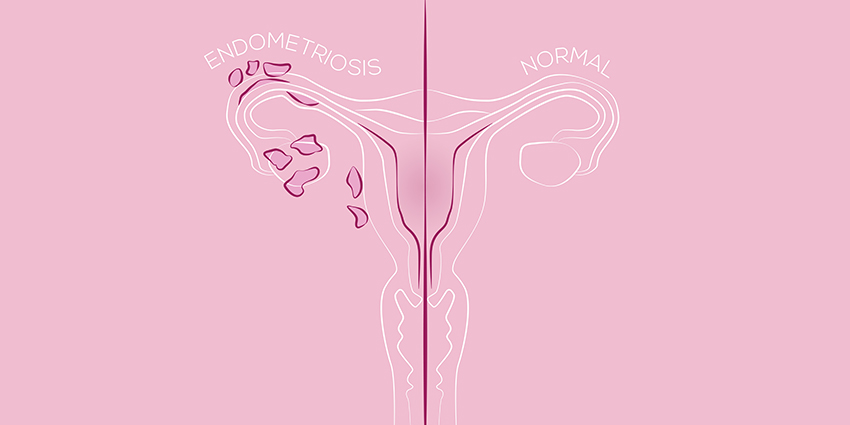Perhaps you’ve been diagnosed with endometriosis and you’re living with some of the dreaded effects, like painful sex, or maybe you’ve yet to visit your healthcare provider, but are having some difficulty during intimacy.

Unfortunately, there are many women who have endometriosis, and may not even know it. If you identify with some of the symptoms and information below, we strongly suggest visiting your gynaecologist.
This disorder can have some terribly uncomfortable side effects, and we all deserve to manage and make our lives as enjoyable as possible… and that includes our sex life.
What is Endometriosis?
Endometriosis is when all or parts of the endometrium grow outside of your uterus. In those without endometriosis, the endometrium lines the uterus, and plays an important function in reproduction such as the menstrual cycle and pregnancy. Polycystic Ovary Syndrome (PCOS) is a hormonal condition that causes similar side effects, so keep that in mind when talking to your gynaecologist.
With those who have endometriosis, the tissue still functions as it should. However, during menstruation, there is nowhere for the tissue to exit the body, thus it becomes trapped.
This disorder can become worse when surrounding tissue becomes irritated, creating scar tissue and adhesions, causing pelvic tissue and organs to stick to each other. If this happens, there is potential to induce bouts of intense pain, especially during one’s period (dysmenorrhea).
What Are the Symptoms of Endometriosis?
The most common symptoms of endometriosis include:
- Painful periods
- Fatigue
- Bloating
- Nausea
- Pain during sex
- Painful bowel movements or urination
- Excessive bleeding during and in between menstrual periods
- Infertility
It’s important to note that the severity of the pain isn’t always an indication of the extent of your condition. Mild endometriosis may come with chronic pain, and advanced endometriosis may come with little or no pain.
And while one could possibly connect the dots using this list of symptoms and visiting their healthcare professional, there is no exact cause of endometriosis.
The Link Between Endometriosis and Painful Sex
For many women, having endometriosis means experiencing pain during penetrative sex. This is especially true if endometriosis is behind the vagina in the lower uterus. During penetration, irritated tissue can be stretched, which then creates agonising discomfort.
Physical sensation aside, endometriosis too can have a big mental effect on one’s sex life (and life in general). It can create tension in relationships, a lower desire to have sex, and anxiety surrounding intimacy.
And because sex is something that partners want to enjoy together, if one person is actively not wanting to engage in sexual activity, it may leave their partner to feel unwanted or rejected.
Endometriosis: How to Ease Pain During Sex
While there is no magical cure or remedy for pain during sex while living with endometriosis, there are some ways to ease the pain or discomfort.
Communication
As we mentioned, intimacy can be disrupted in relationships due to endometriosis. It can cause friction, arguments, and feelings of anxiety or rejection for both partners. And even though talking about endometriosis may be stressful or difficult, relaying your experience to your partner may help them to understand how you’re feeling, and why you’re not as inclined to be intimate.
Visit Your Doctor
Sexual health is important, so talking with your doctor about your endometriosis is nothing to be ashamed of. It’s also worth the short-lived uncomfortable discussion as a means to have a better level of physical and mental health. Your doctor may be able to prescribe medication or suggest activities that can help you control your endometriosis. They may also recommend that you have laparoscopic surgery, which will remove as much of the tissue outside of the uterus as possible.
Try New Positions
If you’re with someone who is understanding and open to experimenting new ways to enjoy intimacy together, why not try new positions? For some women, only certain positions cause pain, leaving room for a change up in the bedroom. For example, shallow penetration during side-by-side spooning may be a good option for those who endure pain during sex. You may also want to have slower, more sensual penetration to ease some of the discomfort.
Foreplay is The Play
Penetrative sex is not the be-all and end-all when it comes to sex. In fact, foreplay is important in any relationship, as it allows both partners to become more relaxed and aroused. Things such as a sensual massage, using toys, and oral stimulation are perfect ways to enjoy intimacy. This aside, when partners put all of their focus on penetrative sex and orgasm, it can create problems. For example, when two people are constantly trying to achieve orgasm as a means to ‘end’ sex, it takes away from the journey, the sexual build-up, and excitement. And don’t forget that most women need some kind of clitoral stimulation for sheer sexual bliss anyway, so you may as well face the music that foreplay is thee play.
Use More Lube
A lot of people tend to underestimate lubricant, believing that it’s merely an aid for those who have vaginal dryness or for those who enjoy anal play. But actually, there’s a lot to love about an extra slippery glide! And for those with endometriosis, lube is even more important, as the condition itself may cause dryness. Opt for a vaginal lubricant made especially for vaginal dryness to help ease some of the pain attached to endometriosis, but make sure that it is condom-safe (if you’re using condoms).
Timing
For some, it may be less painful to have penetrative sex in the week after ovulation, or in the two weeks following a period. This, of course, doesn’t apply to all women with endometriosis, but it is worth experimenting. There is even some evidence to suggest that certains foods are better for you at different times of your cycle.
Relaxation Techniques
Feeling anxious before intimacy is a reality for many people, not just those living with endometriosis. This is why performing one or two relaxation techniques may help ease the stress as well as the pain. For example, you could take a warm bath to relax the body, you could take pain medication one hour before penetrative sex, or you could meditate, light scented candles, or do breathing exercises that may help you unwind.
So, while endometriosis is an extremely unfair diagnosis, it can be managed. By having a more positive attitude and focusing on what you can do instead of what you can’t, you’ll begin to find new ways to enjoy your sex life—and that in itself, is an adventure!
